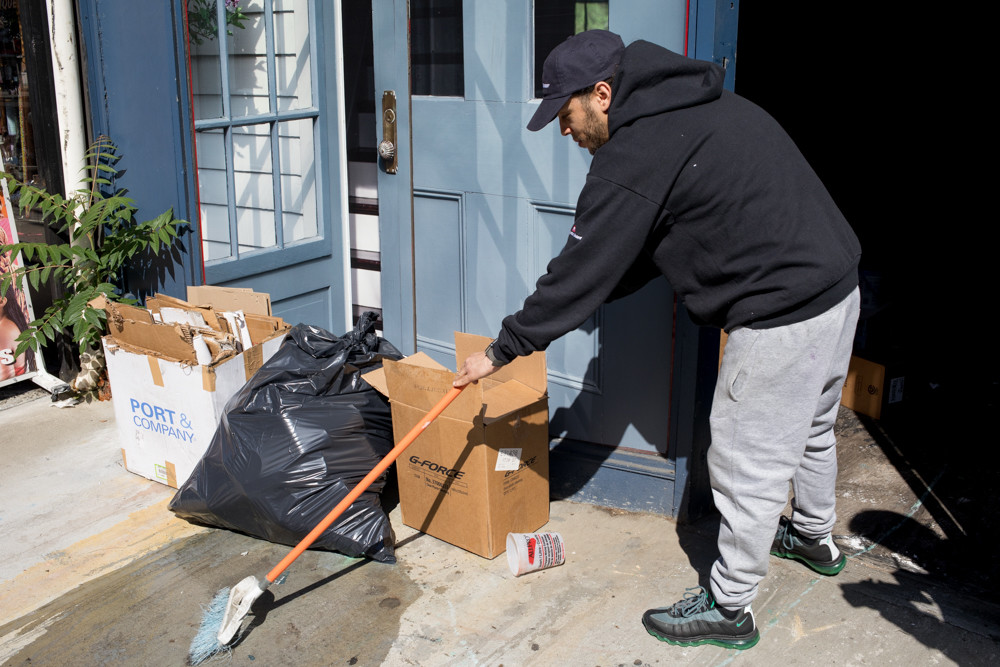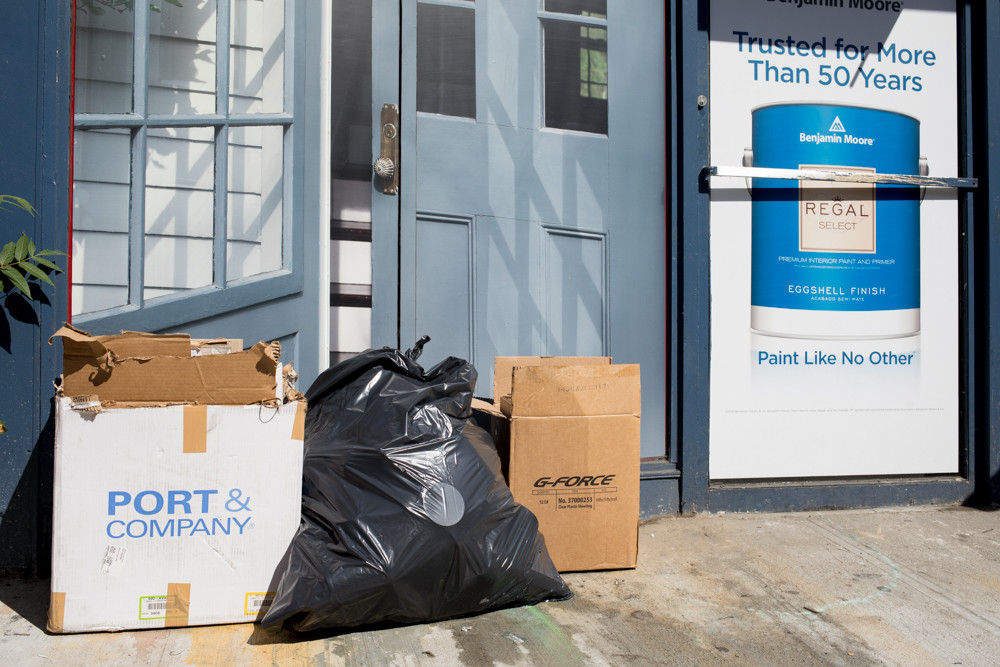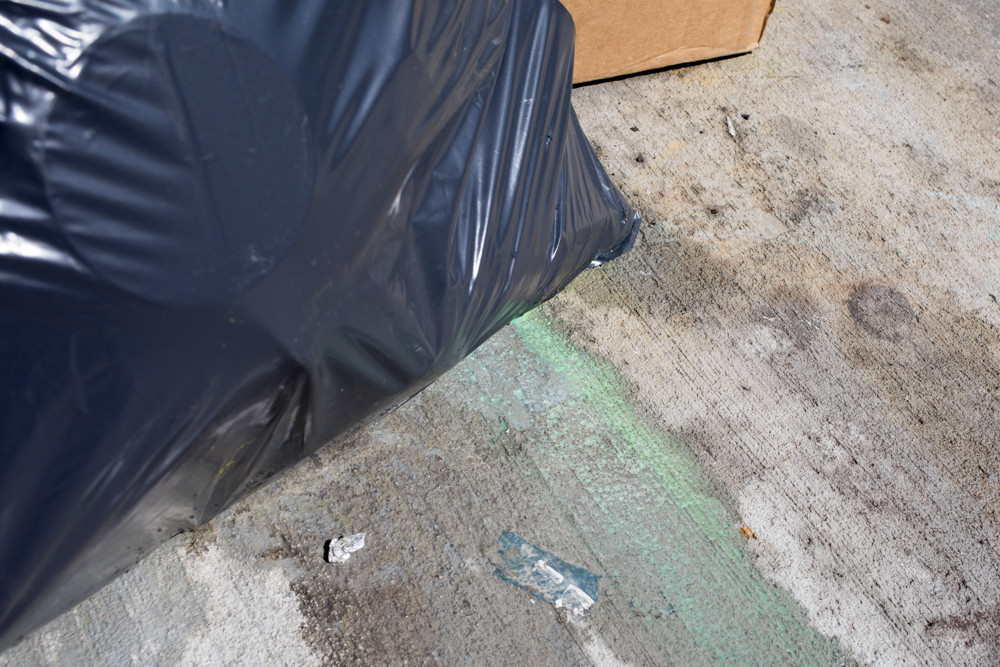Trash collection overhaul spooks business owners
Mark Lipton’s business generates a fair amount of waste from cardboard boxes and empty cans.
Still, it’s “not what I would call a particularly onerous amount,” he said.
Lipton pays about $65 a week to Action Environmental Services to collect trash from his Kingsbridge business, Tremont Paint Supply. The cardboard boxes and empty cans are hauled away around midnight each night.
“It’s very fair, to me,” Lipton said. “They do a decent job.”
But the city’s sanitation department has broached a plan that would fundamentally change the commercial waste management industry. And it’s a change some critics say could be bad news for business owners like Lipton.
The city wants to implement “waste collection zones” that would essentially assign commercial collectors, or “carters” like Action Environmental Services, to specific geographic areas.
And that has Lipton concerned.
“I expect with less competition, costs will go up,” he said. “The garbage, I think, is going to be picked up no matter what. The bigger issue is what they’re going to charge me to do it.”
Waste in the city is divided into commercial and residential, with the familiar garbage trucks from the city’s sanitation department visiting homes and hauling their trash away.
But it’s different for businesses, said Kendall Christiansen, executive director for New Yorkers for Responsible Waste Management, a trade association of local companies that handle commercial waste in the city. That refuse is picked up by private companies.
“Over the last 20 years, since the industry was sort of cleaned up of its organized crime influences under Mayor Rudolph Giuliani, the industry has been very competitive,” Christiansen said. “It offers choice to its customers.”
About 20 companies handle approximately 85 percent of the business in the city, Christiansen said, while another 50 or 60 smaller companies pick up the rest.
But having all those different trucks travel around the city in the middle of each night is bad for the environment, according to some critics. And they turned their attention to a program in California that broke up the market into geographic zones, Christiansen said. The city would then pick which companies would provide waste services in those zones.
The original idea called for just one hauling company per zone, but that met with fiery pushback from carters, real estate interests and the wider business community, according to published reports.
The latest proposal, however, would involve up to five waste service companies per zone — still picked by the city. That would limit business owners’ choice for which hauler they’d work with, Christiansen said, as well as how much they’d pay.
“A restaurant or a bar needs different service than a nail salon or an office building,” Christiansen said. “There’s a lot of variety in the city to the types of businesses and the service that they need.”
But sanitation department spokeswoman Belinda Mager said having more than one option per zone under a non-exclusive system “will allow for customer choice and competitive prices.”
Additionally, a competitive bidding process will favor carters that offer high-quality service at lower cost, Mager said. Selected carters would then have to charge below a maximum rate set in their contract to operate in the zone.
“We believe this system will give the customers an opportunity to find the hauler that best meets their needs while bringing much needed improvements to the commercial waste industry,” Mager said, like fewer trucks on the streets, shorter routes, and less worker fatigue.
In fact, the sanitation department estimates the zoned system could reduce hauler truck traffic by 60 percent or more.
But Christiansen isn’t buying it.
“No one really knows how to do this,” Christiansen said. “It’s not been done any place else. You’re going to drive up prices. You’re going to reduce choice. You’re going to reduce competition. None of those things are good for the businesses.”
Sergio Villaverde, who chairs Community Board 8’s economic development committee, is no stranger to the debate. As a small business owner who once maintained a storefront of his own, Villaverde speaks from personal experience to the evolution of an industry with a fraught history.
“The lack of competition came from collusion and corruption,” Villaverde said. “In the old days it was not an open market. Basically the sanitation companies divided up turf amongst themselves, and there were less-than-reputable ways they enforced that,” including threats of violence.
The city implemented the Business Integrity Commission to clean things up, Villaverde said, targeting not just the sanitation industry, but also the fish markets.
“It was a little mystifying to see why the city would want to interfere with the free market system, which is generally what has driven prices down in the private carting industry,” Villaverde said. “It’s ironic that the city would want to go to a system that had been first created by organized crime.”
Supermarkets are worried, too.
“We have a system right now that we feel is working well, and we don’t know why the city wants to tweak it,” said Nelson Eusebio, board member at the National Supermarket Association. “We like to have the ability to pick and choose who we are going to do business with, not the city telling us who they’re going to line us up with.”
The city’s plan probably won’t even be effective in achieving its stated goals.
“If a truck now goes into a 10-block radius and picks up two stores, under the city program, that same truck is going to have to pick up 20 stores,” Eusebio said. “The same fuel emissions are going to be there. So, why the urgency?”
And Lipton agrees.
“The open-market system is working great, and I don’t see the point of stifling competition,” he said. “The same amount of garbage is going to have to be picked up,” regardless of how many trucks are on the road.
“It leaves me thinking that there’s some sort of financial incentive for the city that we just don’t know.”













